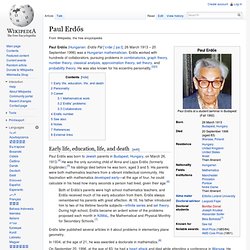

Ronald Graham. Ronald (Ron) Lewis Graham (born October 31, 1935)[1] is a mathematician credited by the American Mathematical Society as being "one of the principal architects of the rapid development worldwide of discrete mathematics in recent years".[2] He has done important work in scheduling theory, computational geometry, Ramsey theory, and quasi-randomness.[3] He is currently the Chief Scientist at the California Institute for Telecommunications and Information Technology (also known as Cal-(IT)2) and the Irwin and Joan Jacobs Professor in Computer Science and Engineering at the University of California, San Diego (UCSD).
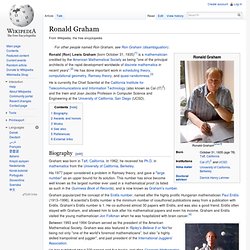
Biography[edit] Graham was born in Taft, California. In 1962, he received his Ph.D. in mathematics from the University of California, Berkeley. His 1977 paper considered a problem in Ramsey theory, and gave a "large number" as an upper bound for its solution. The Bertrand Russell Society - Russell Texts Online. The Thirty Greatest Mathematicians. Click for a discussion of certain omissions.
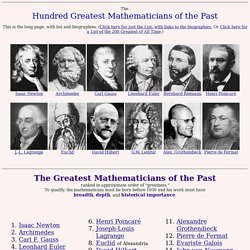
Please send me e-mail if you believe there's a major flaw in my rankings (or an error in any of the biographies). Obviously the relative ranks of, say Fibonacci and Ramanujan, will never satisfy everyone since the reasons for their "greatness" are different. I'm sure I've overlooked great mathematicians who obviously belong on this list. Please e-mail and tell me! Following are the top mathematicians in chronological (birth-year) order. Earliest mathematicians Little is known of the earliest mathematics, but the famous Ishango Bone from Early Stone-Age Africa has tally marks suggesting arithmetic.
Early Vedic mathematicians The greatest mathematics before the Golden Age of Greece was in India's early Vedic (Hindu) civilization. Top Thales of Miletus (ca 624 - 546 BC) Greek domain Apastambha (ca 630-560 BC) India. Hypatia. Hypatia (/haɪˈpeɪʃə/ hy-PAY-shə; Ancient Greek: Ὑπατία; Hypatía) (born c.
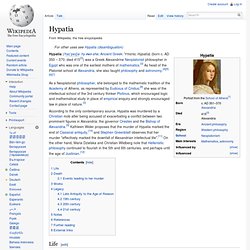
AD 350 – 370; died 415[2]) was a Greek Alexandrine Neoplatonist philosopher in Egypt who was one of the earliest mothers of mathematics.[3] As head of the Platonist school at Alexandria, she also taught philosophy and astronomy.[4][5][6][7] David Hilbert. David Hilbert (German: [ˈdaːvɪt ˈhɪlbɐt]; January 23, 1862 – February 14, 1943) was a German mathematician.
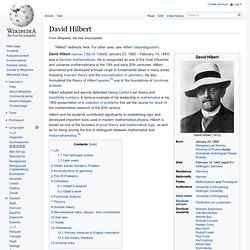
He is recognized as one of the most influential and universal mathematicians of the 19th and early 20th centuries. Hilbert discovered and developed a broad range of fundamental ideas in many areas, including invariant theory and the axiomatization of geometry. He also formulated the theory of Hilbert spaces,[3] one of the foundations of functional analysis. Hilbert adopted and warmly defended Georg Cantor's set theory and transfinite numbers. Christian Goldbach. Christian Goldbach (March 18, 1690 – November 20, 1764) was a German mathematician who also studied law.
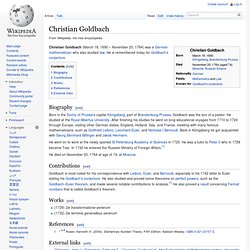
He is remembered today for Goldbach's conjecture. Biography[edit] Born in the Duchy of Prussia's capital Königsberg, part of Brandenburg-Prussia, Goldbach was the son of a pastor. He studied at the Royal Albertus University. After finishing his studies he went on long educational voyages from 1710 to 1724 through Europe, visiting other German states, England, Holland, Italy, and France, meeting with many famous mathematicians, such as Gottfried Leibniz, Leonhard Euler, and Nicholas I Bernoulli. He went on to work at the newly opened St Petersburg Academy of Sciences in 1725. Kurt Gödel. Kurt Friedrich Gödel (/ˈkɜrt ɡɜrdəl/; German: [ˈkʊʁt ˈɡøːdəl] ( ); April 28, 1906 – January 14, 1978) was an Austrian, and later American, logician, mathematician, and philosopher.
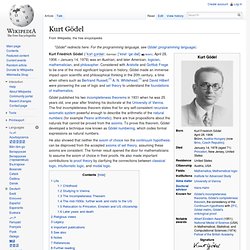
Considered with Aristotle and Gottlob Frege to be one of the most significant logicians in history, Gödel made an immense impact upon scientific and philosophical thinking in the 20th century, a time when others such as Bertrand Russell,[1] A. Bertrand Russell. Russell led the British "revolt against idealism" in the early 20th century.[58] He is considered one of the founders of analytic philosophy along with his predecessor Gottlob Frege, colleague G.
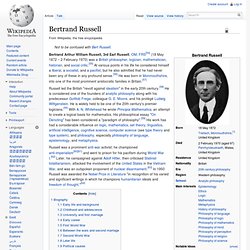
E. Moore, and his protégé Ludwig Wittgenstein. He is widely held to be one of the 20th century's premier logicians.[55] With A. N. Whitehead he wrote Principia Mathematica, an attempt to create a logical basis for mathematics. Leonhard Euler. Swiss mathematician, physicist, and engineer Leonhard Euler ( OY-lər;[2] German: [ˈɔʏlɐ] ( Euler was one of the most eminent mathematicians of the 18th century and is held to be one of the greatest in history.
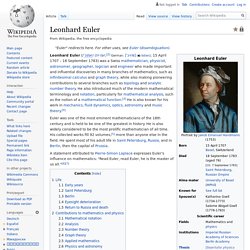
He is also widely considered to be the most prolific mathematician of all time. His collected works fill 92 volumes,[5] more than anyone else in the field. Paul Erdős. Paul Erdős (Hungarian: Erdős Pál [ˈɛrdøːʃ paːl]; 26 March 1913 – 20 September 1996) was a Hungarian mathematician.
